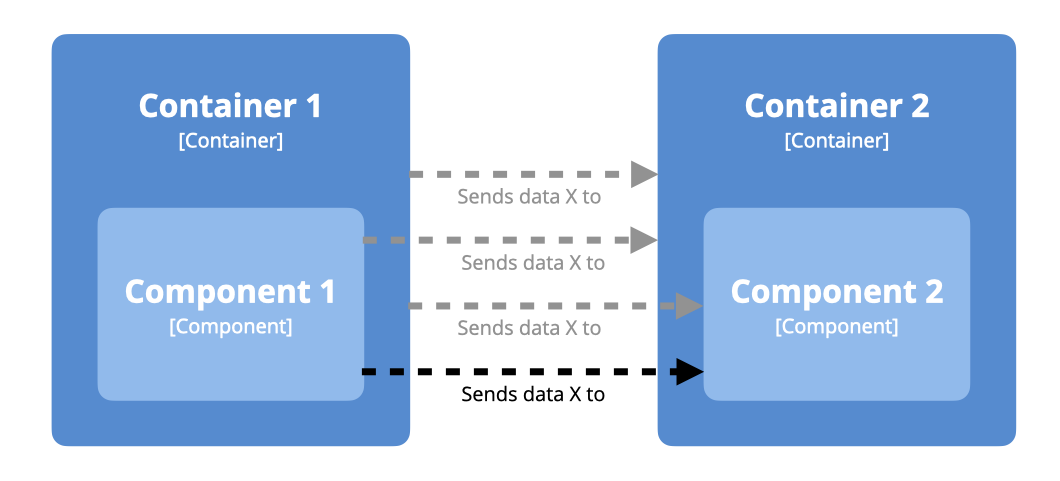Implied relationships
Unlike the Structurizr DSL, the Structurizr for Java library will not create implied relationships. For example, imagine that you have two components in different containers:
SoftwareSystem softwareSystem = model.addSoftwareSystem("Software System");
Container container1 = softwareSystem.addContainer("Container 1");
Component component1 = container1.addComponent("Component 1");
Container container2 = softwareSystem.addContainer("Container 2");
Component component2 = container2.addComponent("Component 2");
And you create a relationship between them:
component1.uses(component2, "Sends data X to");
At this point, the model contains a single relationship between the two components, but there are three other implied relationships that could be added:

| Type | Description |
|---|---|
| Explicit | Component 1 sends data X to Component 2 |
| Implied | Container 1 Sends data X to Component 2 |
| Implied | Component 1 Sends data X to Container 2 |
| Implied | Container 1 Sends data X to Container 2 |
To have the client library create these for you, set an ImpliedRelationshipsStrategy implementation on your model. Provided implementations are as follows.
DefaultImpliedRelationshipsStrategy
This strategy does not create any implied relationships.
model.setImpliedRelationshipsStrategy(new DefaultImpliedRelationshipsStrategy()); // default
component1.uses(component2, "Sends data X to");
Relationships that exist in the model:
| Type | Description |
|---|---|
| Explicit | Component 1 sends data X to Component 2 |
CreateImpliedRelationshipsUnlessSameRelationshipExistsStrategy
This strategy creates implied relationships between all valid combinations of the parent elements, unless the same relationship already exists between them.
model.setImpliedRelationshipsStrategy(new CreateImpliedRelationshipsUnlessSameRelationshipExistsStrategy());
component1.uses(component2, "Sends data X to");
Relationships that exist in the model:
| Type | Description |
|---|---|
| Explicit | Component 1 sends data X to Component 2 |
| Implied | Container 1 Sends data X to Component 2 |
| Implied | Component 1 Sends data X to Container 2 |
| Implied | Container 1 Sends data X to Container 2 |
Although appealing, this strategy typically results in an explosion of relationships in the model, and therefore isn’t particularly useful in real-world usage.
CreateImpliedRelationshipsUnlessAnyRelationshipExistsStrategy
This strategy creates implied relationships between all valid combinations of the parent elements, unless any relationship already exists between them. This is the strategy that the Structurizr DSL uses by default - see DSL cookbook - Implied relationships.
model.setImpliedRelationshipsStrategy(new CreateImpliedRelationshipsUnlessAnyRelationshipExistsStrategy());
container1.uses(container2, "Sends data to");
component1.uses(component2, "Sends data X to");
Relationships that exist in the model:
| Type | Description |
|---|---|
| Explicit | Container 1 Sends data to Container 2 |
| Explicit | Component 1 sends data X to Component 2 |
| Implied | Component 1 Sends data X to Container 2 |
| Implied | Container 1 Sends data X to Component 2 |
This strategy is useful when you want to show a summary relationship at higher levels in the model, especially when multiple implied relationships could be created between elements.
Building your own implied relationships strategy
The ImpliedRelationshipsStrategy interface and AbstractImpliedRelationshipsStrategy abstract class are available if you would like to build your own custom implied relationships strategy.